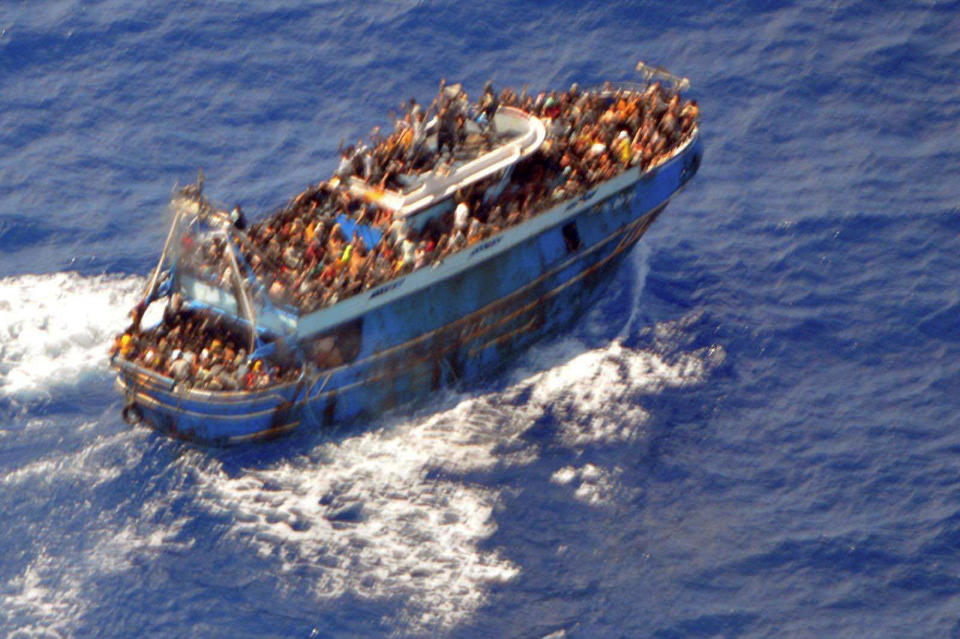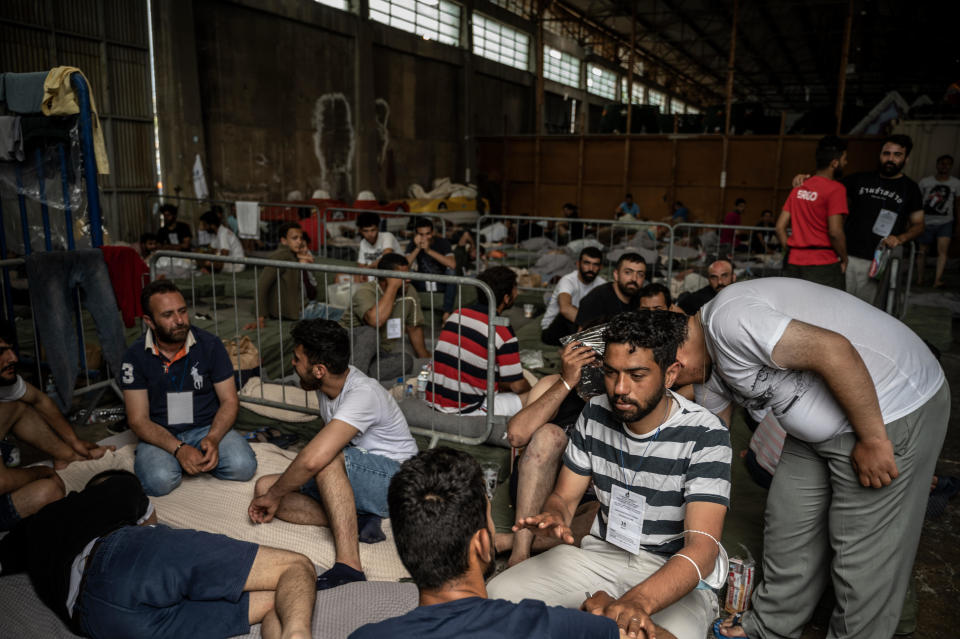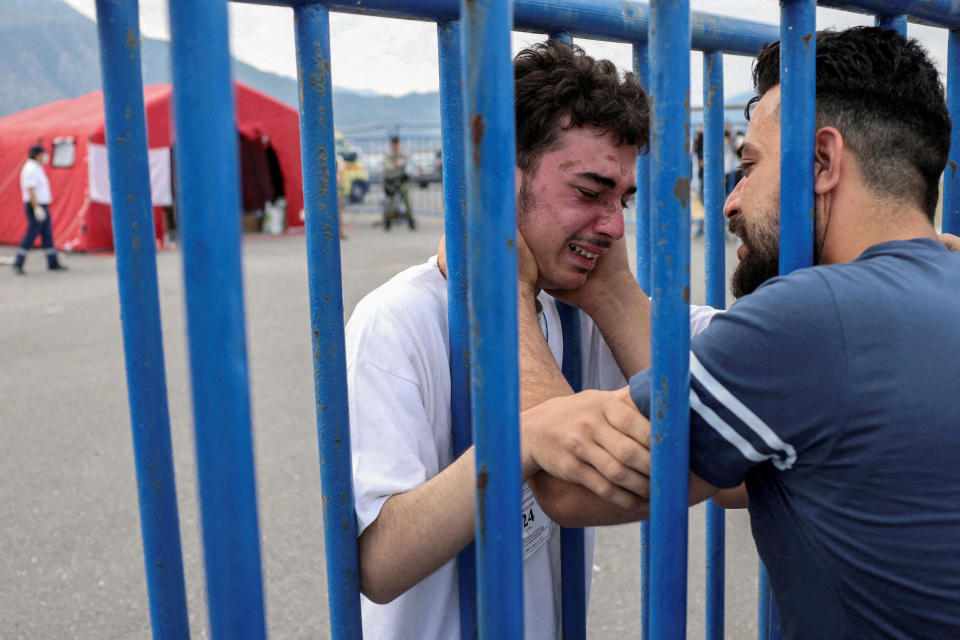Migrant boat disaster: What to know about the tragedy off Greece's coast
The sinking of a dangerously overcrowded fishing boat carrying hundreds of migrants near Greece's coast earlier this month has become one of the deadliest refugee tragedies in recent years, and its already-horrifying death toll is expected to climb.
While just over 100 migrants were rescued at sea, officials have recovered more than 80 bodies and as many as 500 people, including children, are still missing and feared to be dead, according to Greek authorities and United Nations officials. Several men arrested by Greek officials have been accused of smuggling the African and Middle Eastern migrants on the fishing trawler.
The humanitarian catastrophe has shined an international spotlight on the perilous voyage across the Mediterranean Sea that thousands of migrants undertake each month in hopes of reaching Europe, as well as the increasingly strict migration policies adopted by European countries amid mass refugee flows and intensifying migrant resentment domestically. It has also raised questions about the actions, or lack thereof, of Greek authorities before the boat capsized.
Here's what you need to know about the tragedy.
What happened?
On June 13, a plane administered by Frontex, the European Union's border agency, spotted a fishing boat in international waters near Greece that was "heavily overcrowded" and "navigating at slow speed." The agency said it notified Italian and Greek officials of the sighthing and the boat's location.
"The plane was monitoring the fishing vessel for 10 minutes before it had to return to base for refuelling. Frontex offered additional aerial support to Greek authorities on [June 13] but received no response," the agency said in a statement to CBS News. Frontex added that Greek officials asked the agency to instead send a drone to another migrant rescue incident further east, off the coast of Crete.
Video taken by the Frontex plane shows the boat was extremely overcrowded that day, with scores of migrants seen shoulder-to-shoulder on top of the vessel alone. The United Nations migration agency estimated that the vessel was carrying between 400 and 750 migrants.

The Greek Coast Guard said it asked nearby vessels to assist the fishing trawler, and later dispatched its own boat after being notified of the incident. The Greek Coast Guard said one of its boats reached the location of the distressed trawler during the evening of June 13. According to the Coast Guard, migrants on the boat rejected the assistance offer and said they want to continue their journey to Italy.
In the early morning of June 14, Greek Coast Guard officials said, the fishing boat capsized and sank roughly 47 nautical miles from the coastal city of Pylos on the Peloponnese peninsula. Greek officials have said the boat's engine failed.
The survivors who were rescued were transported to Kalamata, a city on the Greek mainland, the Coast Guard added. In a statement to CBS News, the United Nations refugee agency said the migrants on the boat hailed from Afghanistan, Egypt, Libya, the Palestinian territories, Pakistan and Syria. One town in Pakistan lost an entire generation of its young men.
As of June 28, Greek authorities have confirmed rescuing 104 survivors and recovering 82 bodies.
What have the survivors said?
Survivors of the tragedy have told news outlets that the fishing boat was severely overcrowded. Some said the boat began to move after other vessels offered supplies and people on board fought over them.
Other survivors have told news outlets that Greek authorities tried to tow the boat, which caused the vessel to move back and forth. Some of them have partially blamed Greek officials for the tragedy. Greek government officials have so far denied that authorities tried to tow the boat, suggesting that the trawler sank because of the engine's failure and movement by the migrants.
But United Nation officials and other advocates for migrants have said that Greek authorities had a duty to intervene earlier on and get the migrants off the boat, even if they had refused assistance.

"The duty to rescue people in distress at sea without delay is a fundamental rule of international maritime law," the United Nations refugee agency said in a statement. "Both shipmasters and States have an obligation to render assistance to those in distress at sea regardless of their nationality, status or the circumstances in which they are found, including on unseaworthy vessels, and irrespective of the intentions of those onboard."
In a statement, the Greek government said several questions posed by CBS News were being investigated and could not be answered due to legal restrictions tied to an ongoing probe.
Are these tragedies common?
Yes. Deaths of migrants in the Mediterranean Sea have become increasingly common as the number of people taking to the sea in hopes of reaching Europe has increased.

More than 27,000 migrants have died or disappeared in the Mediterranean Sea since 2014, according to the International Organization for Migration, the United Nations migration agency. In the first six months of 2023, the agency recorded nearly 2,000 deaths and disappearances of migrants in the Mediterranean. Officials have said these figures are likely undercounted due to data collection limits.
The majority of migrant deaths have occurred in the central Mediterranean, the sea's busiest migration corridor. Frontex, the EU border agency, recorded over 50,000 migrant detections in the central Mediterranean during the first 5 months of 2023 alone, a 160% increase from the same period in 2022.
Over the past decade, individual disasters have claimed the lives of hundreds of migrants. In 2014, roughly 500 migrants died when a boat sank off the coast of Malta.
What are Greece and Europe's policies towards migrants?
Following the arrival of more than 1 million mostly Syrian refugees to Europe in 2015, many countries on the continent adopted more restrictive asylum and migration policies, in part due to the rise of far-right political parties that employed anti-migrant rhetoric to galvanize frustrated voters.
While EU member states still have relatively generous asylum laws on paper, several countries like Denmark, Hungary, Poland, Italy and Greece have sought to stiffen border controls, tighten asylum rules and increase deportations. Even Sweden, which welcomed the highest number of refugees during the 2015 crisis alongside Germany, has recently proposed restricting migration.
The increasingly hardline policies have predominantly targeted new arrivals from Africa and the Middle East. Following the exodus of millions of refugees from Ukraine following the Russian invasion, all European countries, including Poland and Hungary, welcomed the displaced Ukrainians with open arms.
The Greek government, which has complained of shouldering a disproportionate burden of refugee flows due to Greece's position in the Mediterranean and proximity to Asia, has long been accused by human rights officials of mistreating migrants and breaching international law. Reports have documented instances of Greek officials abandoning asylum-seekers, including women and children, at sea, in violation of international refugee law and EU policy.
GOP candidates speak at Moms for Liberty event amid protests
President of GLAAD on Supreme Court ruling: "License to discriminate against LGBTQ folks"

